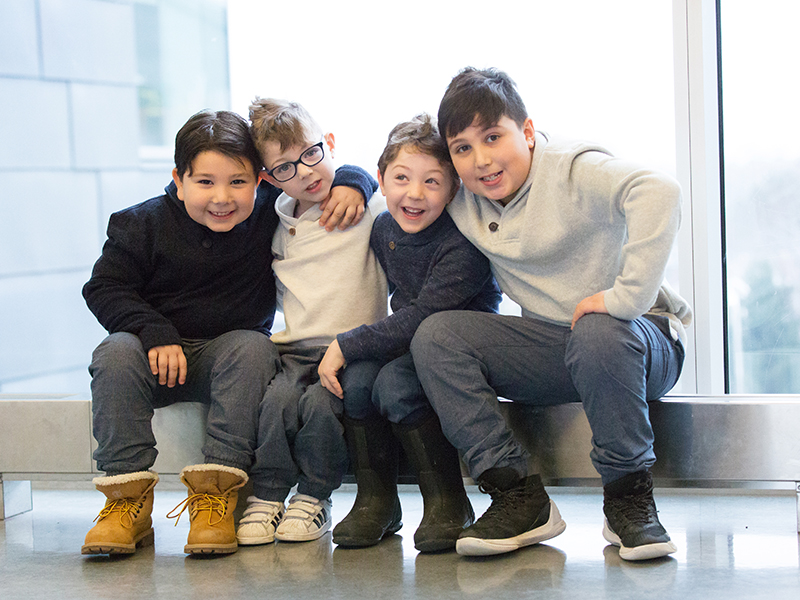With four active boys all under the age of nine and the youngest two being twins, the Shwarzman’s have a bustling household. And when one of the twins, five-year-old Ben, underwent selective dorsal rhizotomy (SDR) surgery in November at the Hospital for Sick Children (SickKids) in Toronto, life got even more hectic.
Ben was born with cerebral palsy (CP), a neurological condition that is caused by an injury to the brain, most often during pregnancy or childbirth.
“It was completely unexpected,” said Marcie Shwarzman on her uncommon delivery. Shwarzman experienced a normal pregnancy until week 33, when she had what she calls a silent delivery. “On Oct. 19, 2013, Noah literally flew out. I still had my clothes on, there was no labour.”
Then the unthinkable happened. With Ben still in utero, Shwarzman’s cervix closed and doctors scrambled to perform an emergency C-section. “In those six minutes before Ben was born, there was a lack of oxygen to his brain,” said Shwarzman. “And that resulted in him being born with cerebral palsy.”
READ: MAN CREDITS HELP, JUDAISM IN OVERCOMING MENTAL ILLNESS
CP affects an average of one out of every 500 children in North America. One of the most common symptoms of the condition is increased muscle tone that produces stiffness, also known as spasticity, which interferes with movement and can be associated with discomfort and pain.
“What was hindering Ben was his lower legs,” said Shwarzman. “Imagine your legs constantly pulling tight like an elastic and you are in constant pain all the time. If we didn’t massage his legs in the morning, he would fall right out of bed and he would get tired very quickly from walking and fall over.”
Selective dorsal rhizotomy (SDR) surgery can help pediatric patients living with CP to potentially walk independently. Ontario now provides the opportunity for children who meet the eligibility criteria to undergo SDR, through the SDR program at SickKids and the Holland Bloorview Rehabilitation Hospital, which includes an assessment clinic, surgery and post-operative rehabilitation.
SDR surgery is a procedure that treats muscle spasticity caused by abnormal communication among the brain, spinal cord, nerves and muscles. It corrects muscle spasticity by cutting the nerve rootlets in the spinal cord that are sending abnormal signals to the muscles.

Before the early 2000s, SickKids routinely performed SDR for children with CP and then stopped when the Ontario government defunded it. Patients were forced to go to the United States or the Shriners Hospital for Children in Montreal.
“When OHIP (Ontario Health Insurance Plan) published the surgery would return to SickKids in the year 2018, the doctor to perform the surgery received funding for 12 children,” said Shwarzman. “Our family applied, we were one of hundreds of applicants. We met with doctors and neurologists for an in-depth assessment – their criteria is very strict.”
Described as “the happiest child you will ever meet,” Ben is very self-motivated. “It’s been an uphill battle,” said Shwarzman, “but he is eager.”
Following his surgery, Ben is no longer in pain. He has a lot of endurance and his core muscles are much stronger.
The students have written Ben individual cards of encouragement and Chai Lifeline made sure that our children were taken care of.
– Marcie Shwarzman
“Ben was in a wheelchair and later progressed to using a walker. But now he is walking independently again. His moves are seamless, whereas before it was very strategic – you can see that in his motor planning, it’s not even a thought,” said Shwarzman.
Ben undergoes intensive therapy five days a week. “They are basically teaching him new pathways to walk,” Shwarzman explained.
The Jewish community has shown enormous support. Ben’s siblings attend the north campus of Bialik Jewish Day School, where parents set up a GoFundMe page that exceeded its target, and organized meals.
“I have taken three months off of work to stay with Ben at Bloorview. The school made sure my children understood what was happening and provided them with warm lunches,” said Shwarzman with deep emotion. “The students have written Ben individual cards of encouragement and Chai Lifeline made sure that our children were taken care of, showing them love and support and giving my husband a much-deserved night off during the week.”
What does the family look forward to most when Ben comes home on February 28? “Hockey is huge in our home,” said Shwarzman. “Ben’s brothers and father can’t wait for him to skate with them, something he has never done.”






